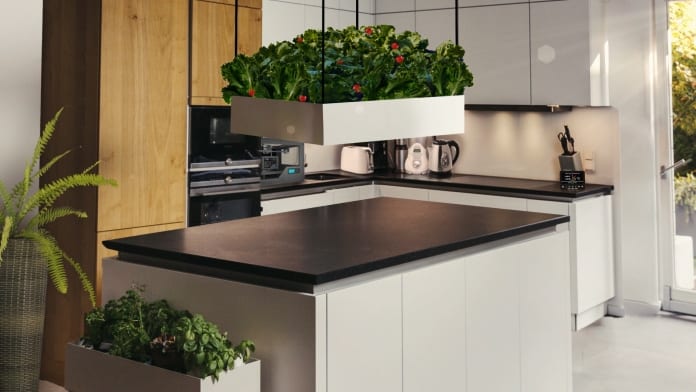From smart bed sheets that can modify temperature,
to colour, fabric and shape-changing AI furniture
– experts reveal what the Smart E-Home of the future could look like
- Seven in ten Welsh people would like to live in a more eco-friendly home
- 84% are interested in new technology which would make their homes greener
- Smart Energy GB, and a panel of experts, including Carol Vorderman, Robert Llewellyn, Dr Ian Pearson, Dr Jo Patterson, has visualised the smart eco home of the future – the Smart E-Home – which will help build a cleaner, greener Britain
- The small steps we are taking now, such as requesting a smart meter, will pave the way for the future Smart E-Home
For release 29th July 2019: Experts have come together to visualise what the smart eco home – the Smart E-Home – of the future could look like, complete with smart toilets, living rooms which transform colour, texture and shape via voice-command, community-based electric vehicle car-pooling and living kitchens with hydroponic fruit and veg gardens.
Smart Energy GB, Go Ultra Low and a panel of experts passionate about the environment, engineering, architecture, futurology and electric vehicles, met to discuss the technologies evolving now which could mean that these innovations become a reality in the not too distant future.
Key components include:
- Bed sheets which can be different temperatures according to bed partners’ individual preferences
- Smart cushions and furniture which change colour, fabric and texture using augmented reality, reducing the need to replace them when you redecorate
- Hydroponic indoor gardens which, with efficient light use, will mean we’ll have fresh vegetables to harvest in our own kitchens – these could take up as much space as a wall cabinet or bookshelf
- An electric vehicle charging station and vehicle – one giant battery for your home and energy for neighbourhood usage, with neighbourhood carpooling providing an alternative to public transport
- Bathrooms which track your health statistics in real-time
- Toilets which turn waste into fuel
Smart meters, which are the building blocks of a smart energy grid, are a key part of this future. They will provide the grid with information to add more capacity when needed, change our electricity consumption patterns and make it easier to add electric vehicles, solar panels, wind turbines and heat pumps to the energy system.
Smart Energy GB also commissioned research which reveals that 71% of Welsh people would like a more eco-friendly home, but almost two in 10 (19%) don’t know how to go about it and almost two thirds (63%) think it’s too expensive. Despite this, 84% of Welsh people are interested in new technology which would make their homes greener.
The poll of 102 Welsh adults revealed that owning a composting bin and energy efficient whitegoods, and having a smart meter and a water efficient showerhead installed, are just some of the small steps the nation is already taking to create a more sustainable way of living.
Looking to the future, Welsh people predict the Smart E-Home would have a giant battery to store energy from the sun and include windows which adapt to light to keep your home hot or cold without the need for heating or air conditioning.
Others anticipate a life where we can live entirely on recycled rainwater, or even having micro-turbines in homes to help generate energy (33%).
Dr Ian Pearson, Futurologist, comments: “The future will give us richer lives with a lower environmental impact. It’s encouraging to see adults will prioritise reducing their energy demand via smart windows, solar panels and paints, and small wind energy harvesters, and then using smart meters to allow any extra energy to be sourced from renewables.”
1,000 children were also surveyed and agree with the experts that the future holds toilets which turn waste into fuel. Some youngsters also predict glass domes to capture energy from sunlight and even people living underwater.
And whilst both adults and children think that this home won’t be a reality for another 23 years, it’s not actually that far off at all. The small steps we are taking now, such as requesting a smart meter from our energy suppliers, will pave the way for the future Smart E-Home.
Dr Ian Pearson continues: “Making homes greener certainly won’t mean making them low tech. With the Smart E-Home, it will be possible for us to entirely redecorate our homes without buying new fixtures or fittings. Instead we’ll use augmented reality and smart furniture made from reconfigurable materials. Our homes will use renewable energy, stored in home batteries, and will make our lives easier. Hydroponics, for example, will grow fresh salad and herbs, reduce the number of trips to shops while improving our diet. Special LED lighting will provide the colours of light that plants prefer, avoiding waste, and of course smart meters can provide the energy for this lighting when it is cheapest.
“We know electric transport will grow rapidly in popularity, especially now that EV charging points will be compulsory in new-build homes. Smart meters and smart charging will support this transition, helping us charge EVs with cheaper, greener energy. There might even be instances where you could get paid to charge your car when the power system needs us to use more power. This often happens when there is too much renewable energy on the system.
“Smart has to mean smart to the environment, smart in using new technology, and smart in how we control it.”
Dr Jo Patterson from Cardiff University said: “The digital revolution has already changed the way we use our homes. New technologies, such as smart meters, can help us to control our homes to provide comfortable and safe and very liveable environments. These technologies can be interconnected and can make decisions for us based on our previous experiences and behaviour. This not only frees up time for social activities but can also help us to use as little energy as possible therefore reducing carbon emissions and the impact on climate change, for a cleaner, greener Britain.”
Robert Cheesewright. Director of Corporate Affairs, Smart Energy GB concludes: “Smart meters are bringing the future into our homes today. They’re the first step to being in control of our energy use, of saving money by using energy more efficiently, and helping to create a smart energy grid.
“A smart grid makes it easier for us to draw on and store electricity when it’s less in demand, and then use it again when scarce or more expensive later in the day. Together, smart meters and a smart grid help to create a cleaner, greener Britain.”
To see the Smart E-Home – go to https://www.smartenergygb.org/en/smart-living/the-smart-e-home-of-2030
Help keep news FREE for our readers
Supporting your local community newspaper/online news outlet is crucial now more than ever. If you believe in independent journalism, then consider making a valuable contribution by making a one-time or monthly donation. We operate in rural areas where providing unbiased news can be challenging. Read More About Supporting The West Wales Chronicle

























